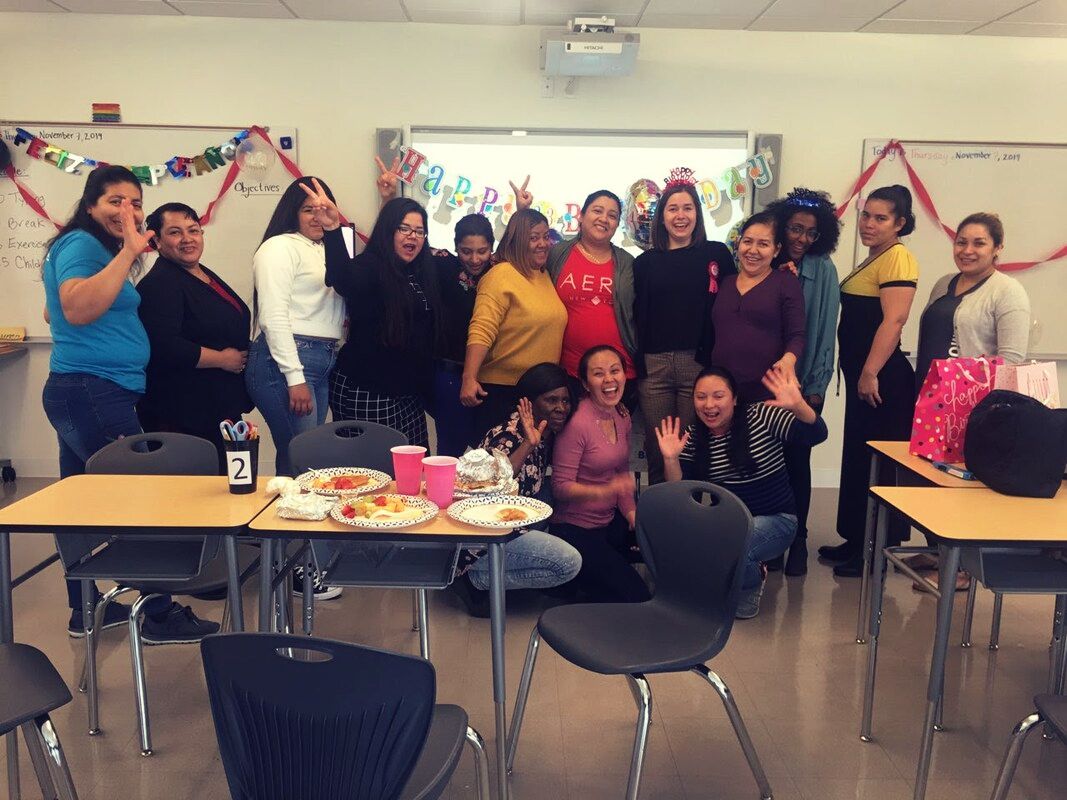|
BY LAUREN HUNTER Small talk is usually one of my favorite things. I truly enjoy having conversations that stem from the basic get-to-know-you questions (Where did you grow up? What do you do? Wait, you ALSO love Dolly Parton?!), because I usually have a ready answer. However, during the opening retreat at the Motherhouse, I found people asking me questions that I had no set answers to. Mainly, these questions were about my work placement. I remember eating meals in the dining room at the Motherhouse, sitting with different Loretto Community members, as we chatted and tried to find what we had in common. One of the things that we could easily connect over was volunteer work, as they had dedicated their entire lives to service. The Sisters usually asked me about the work I would be doing at my placement, Briya Public Charter School. And despite all the research I did for my interviews with Loretto and Briya, and all the email communication I had with my supervisor over the summer, I found that I had a hard time answering their questions about what my placement would be like. Of course, I knew what my job description was. But I felt like I wouldn’t know what to expect from my placement until I started my job. In fact, I was nervous. What would my students be like? What about my coworkers? Were my teaching skills actually good enough for this job? I had no idea.  Ethiopian coffee ceremony at Briya's holiday party. Photo by Lauren Hunter. Ethiopian coffee ceremony at Briya's holiday party. Photo by Lauren Hunter. Officially, I am an Associate Adult Education Instructor at Briya. Sounds great, but what does that mean? Briya is a unique school in the DC school system. It’s a two-generation family program, with classes for children ages 0-5 and adults. My students are immigrants who are English language learners. To study at Briya, the only requirements are that you live in DC and have a child under the age of 15. If you have a child under 5, they can go to an early childhood class while you are in English class. Once a student enrolls in Briya, they not only have access to the English classes, but since we are focused on family education, our students also participate in a weekly Child Development class and Family Time, where they go to their child’s classroom and do an educational activity together. Students also have digital literacy classes and access to social services and mental health therapy at school. I co-teach an Intermediate class in the mornings, and a Basic class in the afternoons. Every day looks different for me, but I spend most of my time in the classroom, supporting my co-teacher and students. I do everything from tutoring students, to proctoring a standardized exam, to calling students who were absent, to making materials for technology class, and more. Now I’ve been at Briya for five months. I like my work a lot. I’ll be honest, though. It isn’t the time I spend grading papers or inputting data into spreadsheets that makes me feel good about the work I’m doing—it’s the time I spend connecting with my students. When I started at Briya, I wasn’t expecting to have such meaningful relationships with my students. I was mainly nervous about the age dynamic. I’m 23 years old, and many of my students are in their 20s and 30s, but I am also significantly younger than a lot of them. All of my students are parents, and yet I have no children. All of my students are immigrants, and I have only ever lived in the US. I was expecting it to be difficult to connect with my students, given our different identities and life experiences. However, this wasn’t the case at all. Each of my classes feels like a family. We celebrate birthdays together, support students who are going through periods of mourning or loss and share successes that my students have had in their jobs or with their families. In November, my Basic students threw me a surprise party complete with a feast of pupusas, tamales, and a tres leches cake. I was already incredibly touched by all of the thought and care they put into the party, and then my students got up and gave speeches about how much Briya and our class means to them. If I hadn’t realized before how English class was so much more than just English class, now I definitely did. My students all come to class for a variety of different reasons—some want to learn English to get better jobs, some want to help their children with homework, some want to be able to navigate the world outside their communities, some want a break from being with their children all day, and some have few connections in DC and are simply looking for community. Every life and personal history in our classroom is different, but the community we’ve built is important for everyone. I want to cultivate a classroom where each student comes in and feels at home. With many students who had limited education in their home countries, it is critical that the classroom can feel like a comfortable environment for every student. Since my students come from many different countries, we also try to make our classroom a place where students can share about their cultures and cultivate pride. One of my favorite experiences was taking part in a beautiful Ethiopian coffee ceremony during a Briya holiday party. I’ve learned a lot about my student’s cultures, religions, and home countries, too. And yes, while my students occasionally tease me about my young age, or the fact I don’t have children (all lightheartedly, of course), I’ve found that my identity hasn’t stopped me from building relationships with my students. My attempts at small talk before class in Spanish, or in my basic Amharic, have allowed for connections with my students where they take on the role of the teacher, correcting me or teaching me new phrases. And I haven’t only learned more Spanish or Amharic from my students—I’m also continually learning from them in their commitment to learning, their dedication to their families, and how there are so many structures of oppression working against them here in DC and in the US, and yet they are in class every day, learning a difficult new language. I have so much gratitude for my students. I go to work to teach, but I end up learning something every day. Each of my students has wisdom to share with me, and I’m grateful that they do. Now, when I get asked about my placement, I find it’s hard to stop talking about it. I have so much to say, so many stories to share. I feel so lucky. Lauren Hunter (she/her) grew up outside of Ann Arbor, Michigan, but left after graduating high school to attend Bryn Mawr College near Philadelphia. She graduated with a history degree in 2018 and has spent time working in education since. Lauren loves to hike, bake just about anything, and read her favorite books over and over again. This year, she is working at Briya Public Charter School in Washington, D.C.
1 Comment
Mary Swain
10/31/2020 07:54:58 am
Lauren, Such important work you are doing, and you understand the most important, perhaps, is being with your students. Thank you. Mary
Reply
Your comment will be posted after it is approved.
Leave a Reply. |
In Their Own WordsWe invite you to get to know Loretto Volunteers and the program here. Volunteers introduce themselves and reflect on their experiences. |


